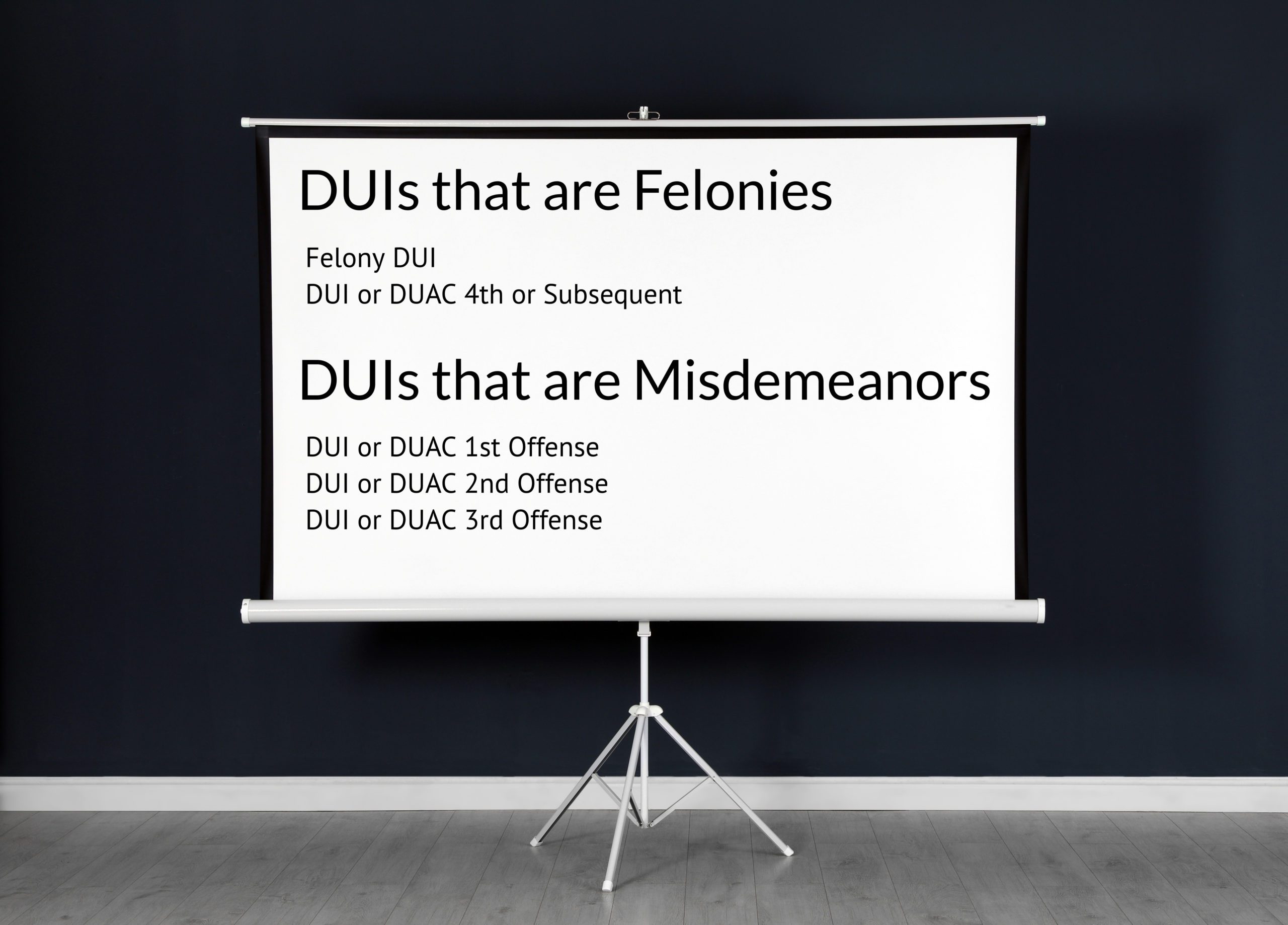Is DUI a felony or a misdemeanor offense in SC?
DUI 1st, 2nd, and 3rd offenses are classified as misdemeanors under SC law, but DUI 4th is a felony offense, as is the separate offense of “felony DUI.”
In this article, we will look at what makes driving under the influence/ DUI a felony in SC, and when it is considered a misdemeanor, including:
- Why DUI 1st, 2nd, and 3rd offenses are misdemeanors,
- Why DUI 4th or subsequent offense is a felony, and
- The difference between an “ordinary” DUI and the separate offense of “felony DUI.”
When is Driving Under the Influence/ DUI a Felony in SC?
Most driving under the influence (DUI) and driving with an unlawful alcohol concentration (DUAC) charges in SC are misdemeanor offenses.
That doesn’t mean they are not serious – a DUI 3rd offense can carry up to five years in prison, and the consequences for even a first offense can include:
- Mandatory jail time,
- Fines,
- Court costs,
- ADSAP,
- License suspension,
- License revocation as a habitual traffic offender,
- Difficulty finding employment, and
- A permanent criminal record for drunk driving that cannot be expunged.
Many criminal statutes in SC identify 1) the elements of the crime, 2) the potential punishments for the crime, and 3) whether an offense is considered a misdemeanor or a felony.
When you look at SC’s driving under the influence laws, found in SC Code § 56-5-2930, there is no mention of whether a conviction will be considered a misdemeanor or a felony, which may cause some confusion about whether a DUI conviction will be a felony conviction.
So, how do we know whether a DUI is a felony or a misdemeanor?
DUI 1st Offense is a Misdemeanor
There are two sources in the SC Code that confirm DUI 1st offense is a misdemeanor in SC.
First, SC Code § 16-1-10(C) states that “[a]ll offenses with a term of imprisonment of less than one year are misdemeanors,” and this includes DUI or DUAC 1st offense which has a maximum penalty of 90 days in jail if the BAC is .15 or higher.
Second, SC Code Section 56-5-6190, the Chapter that contains SC’s DUI laws, says that “it is a misdemeanor for any person to violate any of the provisions of this chapter unless such violation is by this chapter or other law of this State declared to be a felony.”
DUI 2nd or 3rd Offense are Misdemeanors in SC
DUI 2nd or 3rd offense are considered misdemeanors as well, and they are specifically listed in SC Code § 16-1-100 as misdemeanor offenses.
DUI second offense is identified as a “class C” misdemeanor in 16-1-100(C):
(C) The following offenses are Class C misdemeanors and the maximum terms established for a Class C misdemeanor, not more than one year, as set forth in Section 16-1-20(A), apply:
… Unlawful for narcotic users or persons under influence of liquor, drugs or like substances to drive (See Section 56-5-2940(2))-Second offense 56-5-2933 Driving with an unlawful alcohol concentration, second offense..
And DUI third offense is identified as a “class A” misdemeanor in 16-1-100(A):
(A) The following offenses are Class A misdemeanors and the maximum terms established for a Class A misdemeanor, not more than three years, as set forth in Section 16-1-20(A), apply:
…56-5-2930 Unlawful for persons to drive under influence of liquor, drugs, or like substances (See Section 56-5-2940(3))-Third offense 56-5-2933 Driving with an unlawful alcohol concentration, third offense…
DUI 4th or subsequent offense
SC Code § 16-1-90 lists criminal offenses that are considered felonies under SC law, and this includes DUI 4th and DUAC 4th or subsequent offenses which are classified as “class F” felonies:
…(F) The following offenses are Class F felonies and the maximum terms established for a Class F felony, not more than five years, as set forth in Section 16-1-20(A), apply:
… results 56-5-2930 Driving under influence of liquor, drugs, or like substances unlawful (See Section 56-5-2940(4)) 56-5-2933 Driving with an unlawful alcohol concentration, fourth or subsequent offense 56-5-4975(B)…
What is the Difference Between a Misdemeanor DUI and a Felony DUI in SC?
Although a DUI 4th or subsequent offense is classified as a felony under SC law, it is not a “felony DUI.”
The separate offense of “felony DUI” is also classified as a felony, but it is a much more serious offense than even DUI 4th or subsequent, the penalties are more severe if convicted, and felony DUI has different elements that the State must prove to get a conviction.
To prove felony DUI, the State must prove that:
- You were driving,
- While driving, you were under the influence,
- You caused an accident through your negligence, and
- Another person was either killed or suffered great bodily injury as a result.
Felony DUI when it results in great bodily injury to another person can carry as much as 15 years in prison and has a mandatory minimum sentence of 30 days in jail.
Felony DUI when it results in someone’s death can carry up to 25 years in prison and has a mandatory minimum sentence of one year in prison.
In summary:
- DUI 1st, 2nd, or 3rd offenses are misdemeanor offenses in SC, and
- Although a DUI 4th or subsequent conviction is a felony, “felony DUI” is a separate charge that requires different proof than a DUI 4th offense.
DUI Defense Lawyers in Myrtle Beach, SC
If you have been charged with DUI in Myrtle Beach, SC, call your SC DUI lawyer at Coastal Law immediately. We will help you to understand what your potential defenses will be once we have obtained all evidence from the prosecutor and conducted an independent investigation of your case.
Call Coastal Law now at (843) 488-5000 or send us an email message to speak with a SC DUI lawyer today.



